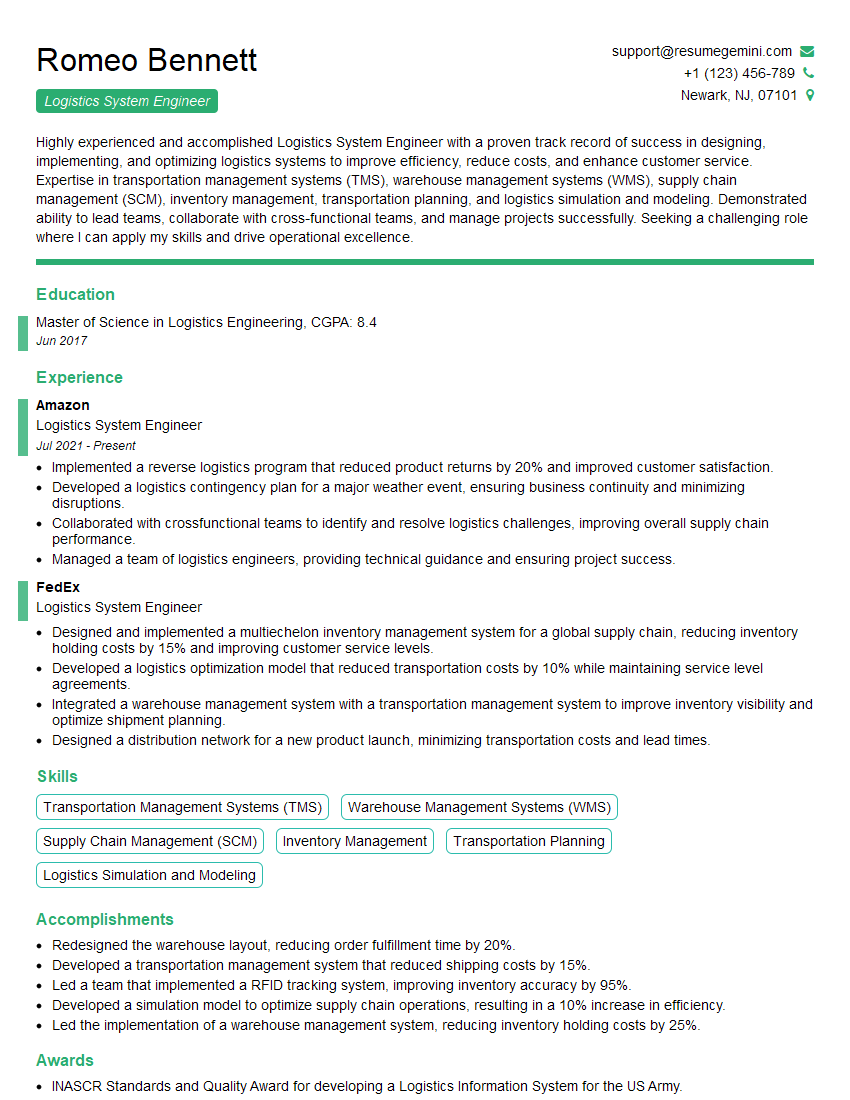Are you a seasoned Logistics System Engineer seeking a new career path? Discover our professionally built Logistics System Engineer Resume Template. This time-saving tool provides a solid foundation for your job search. Simply click “Edit Resume” to customize it with your unique experiences and achievements. Customize fonts and colors to match your personal style and increase your chances of landing your dream job. Explore more Resume Templates for additional options.

Romeo Bennett
Logistics System Engineer
Summary
Highly experienced and accomplished Logistics System Engineer with a proven track record of success in designing, implementing, and optimizing logistics systems to improve efficiency, reduce costs, and enhance customer service. Expertise in transportation management systems (TMS), warehouse management systems (WMS), supply chain management (SCM), inventory management, transportation planning, and logistics simulation and modeling. Demonstrated ability to lead teams, collaborate with cross-functional teams, and manage projects successfully. Seeking a challenging role where I can apply my skills and drive operational excellence.
Education
Master of Science in Logistics Engineering
June 2017
Skills
- Transportation Management Systems (TMS)
- Warehouse Management Systems (WMS)
- Supply Chain Management (SCM)
- Inventory Management
- Transportation Planning
- Logistics Simulation and Modeling
Work Experience
Logistics System Engineer
- Implemented a reverse logistics program that reduced product returns by 20% and improved customer satisfaction.
- Developed a logistics contingency plan for a major weather event, ensuring business continuity and minimizing disruptions.
- Collaborated with crossfunctional teams to identify and resolve logistics challenges, improving overall supply chain performance.
- Managed a team of logistics engineers, providing technical guidance and ensuring project success.
Logistics System Engineer
- Designed and implemented a multiechelon inventory management system for a global supply chain, reducing inventory holding costs by 15% and improving customer service levels.
- Developed a logistics optimization model that reduced transportation costs by 10% while maintaining service level agreements.
- Integrated a warehouse management system with a transportation management system to improve inventory visibility and optimize shipment planning.
- Designed a distribution network for a new product launch, minimizing transportation costs and lead times.
Accomplishments
- Redesigned the warehouse layout, reducing order fulfillment time by 20%.
- Developed a transportation management system that reduced shipping costs by 15%.
- Led a team that implemented a RFID tracking system, improving inventory accuracy by 95%.
- Developed a simulation model to optimize supply chain operations, resulting in a 10% increase in efficiency.
- Led the implementation of a warehouse management system, reducing inventory holding costs by 25%.
Awards
- INASCR Standards and Quality Award for developing a Logistics Information System for the US Army.
- Institute of Industrial Engineers (IIE) Best Practices Award for implementing a lean logistics system in a manufacturing plant.
- Defense Logistics Agency (DLA) Recognition for Exceptional Achievement in Logistics Planning.
- Society of Logistics Engineers (SOLE) Annual Innovation Award for developing a new logistics technology.
Certificates
- Certified Logistics Professional (CLP)
- Certified Supply Chain Professional (CSCP)
- Certified Transportation Professional (CTP)
- Certified Demand Planning Professional (CDDP)
Career Expert Tips:
- Select the ideal resume template to showcase your professional experience effectively.
- Master the art of resume writing to highlight your unique qualifications and achievements.
- Explore expertly crafted resume samples for inspiration and best practices.
- Build your best resume for free this new year with ResumeGemini. Enjoy exclusive discounts on ATS optimized resume templates.
How To Write Resume For Logistics System Engineer
- Highlight your skills and experience in the most relevant areas, such as transportation management, warehouse management, and supply chain optimization.
- Quantify your accomplishments and provide specific examples of how you have improved efficiency, reduced costs, or enhanced customer service.
- Use keywords throughout your resume to ensure that it is easily found by recruiters and hiring managers.
- Proofread your resume carefully for any errors.
Essential Experience Highlights for a Strong Logistics System Engineer Resume
- Design, implement, and optimize logistics systems to improve efficiency, reduce costs, and enhance customer service.
- Conduct logistics analysis and develop solutions to complex supply chain challenges.
- Collaborate with cross-functional teams to identify and resolve logistics issues and improve overall supply chain performance.
- Lead teams of logistics engineers and provide technical guidance to ensure project success.
- Manage logistics projects and ensure timely and successful completion.
- Stay up-to-date on the latest logistics technologies and best practices.
Frequently Asked Questions (FAQ’s) For Logistics System Engineer
What is the role of a Logistics System Engineer?
A Logistics System Engineer is responsible for designing, implementing, and optimizing logistics systems to improve efficiency, reduce costs, and enhance customer service.
What are the key skills required for a Logistics System Engineer?
The key skills required for a Logistics System Engineer include expertise in transportation management systems (TMS), warehouse management systems (WMS), supply chain management (SCM), inventory management, transportation planning, and logistics simulation and modeling.
What are the career prospects for a Logistics System Engineer?
Logistics System Engineers are in high demand due to the increasing complexity of global supply chains. With experience, Logistics System Engineers can advance to management positions or specialize in a particular area of logistics, such as transportation or warehousing.
What is the average salary for a Logistics System Engineer?
The average salary for a Logistics System Engineer in the United States is around $85,000 per year.
What are the educational requirements for a Logistics System Engineer?
Most Logistics System Engineers have a bachelor’s or master’s degree in logistics engineering, supply chain management, or a related field.
What are the challenges faced by Logistics System Engineers?
Logistics System Engineers face a number of challenges, including the increasing complexity of global supply chains, the need to reduce costs, and the need to improve customer service.
What are the trends in logistics systems engineering?
The trends in logistics systems engineering include the increasing use of technology, the growth of e-commerce, and the need for more sustainable supply chains.